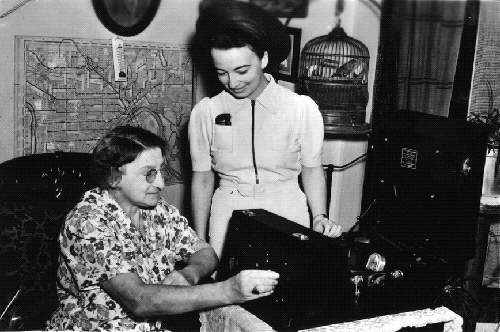Above: This poster, "Story Hour," was created by WPA artist Shari Weisberg. It was one of many that the WPA created to promote reading. Image courtesy of the Library of Congress Prints and Photographs Division.
Above: The description for this photo, taken in St. Paul, Minnesota, reads: "WPA worker demonstrates a talking book to a blind woman." Image courtesy of the National Archives and New Deal Network.
Above: Another story hour poster by WPA artist Shari Weisberg, showing a boy and a girl, on what appears to be a magic carpet, or rather, book ride. Image courtesy of the Library of Congress Prints and Photographs Division.
Above: One of the more interesting WPA projects was the employment of women as "pack horse librarians." Pack horse librarians delivered books and magazines to families living in remote, rural areas. The caption for this photo, taken in 1938, reads, "Carriers, mostly women, travel the remote sections of the state by horse and mule. They meet once a week at their library headquarters where saddle-bags are replenished with books for eager mountain folk. These carriers are paid a small salary by the WPA in Kentucky." Image courtesy of the National Archives and New Deal Network.
Above: A pack horse librarian reads to a Kentucky man who is either injured or ill, and possibly illiterate. This type of service by the government (paying an unemployed woman to deliver and read books to rural Americans), while perfectly in line with the general welfare clause of the U.S. Constitution, would not be tolerated in America today. While plutocracy and special treatment for the super-wealthy has been accepted, and white collar crime tolerated, this type of service to Americans in need would inevitably be denounced as "godless communism!" Image courtesy of the National Archives and New Deal Network.
Above: This woman is transcribing a book into Braille at the Enoch Pratt Library in Baltimore, Maryland, as part of a WPA project to help bring more books to blind Americans. Image courtesy of the University of Maryland College Park Archives.
Above: These women are repairing books at the Enoch Pratt Library in Baltimore, Maryland, as part of WPA project no. 123, in 1936. The description card for this photo reads, "The second step in bookmending is sewing through with clamp and drill when center sections of books are broken--Drilling books and preparing cover for recasing." Across America, over 94 million books were repaired by WPA workers. Image courtesy of the University of Maryland College Park Archives.
Above: A man and two women looking at books at a WPA-operated bookmobile. Across the country, WPA workers--both men and women--assisted, or wholly operated, bookmobiles and libraries. Image courtesy of the FDR Presidential Library and Museum.
Above: This photo shows National Youth Administration (NYA) enrollees in Mississippi being trained as library workers. At the time of this photo, 1936, the NYA was a subdivision of the WPA. This type of work and training opportunity is a stark contrast from the inhuman political rhetoric that we hear today, which would label these women as "takers," and also from the days of slavery, just a few generations before this photo was taken, where blacks were often whipped if they were caught reading, or trying to learn how to read. The history of slavery (i.e., a highlight and warning as to what man is capable of), and the cold-hearted insults hurled at the less-fortunate today, are prime reasons why we need a new, and even stronger, New Deal. Image courtesy of the FDR Presidential Library and Museum.









No comments:
Post a Comment